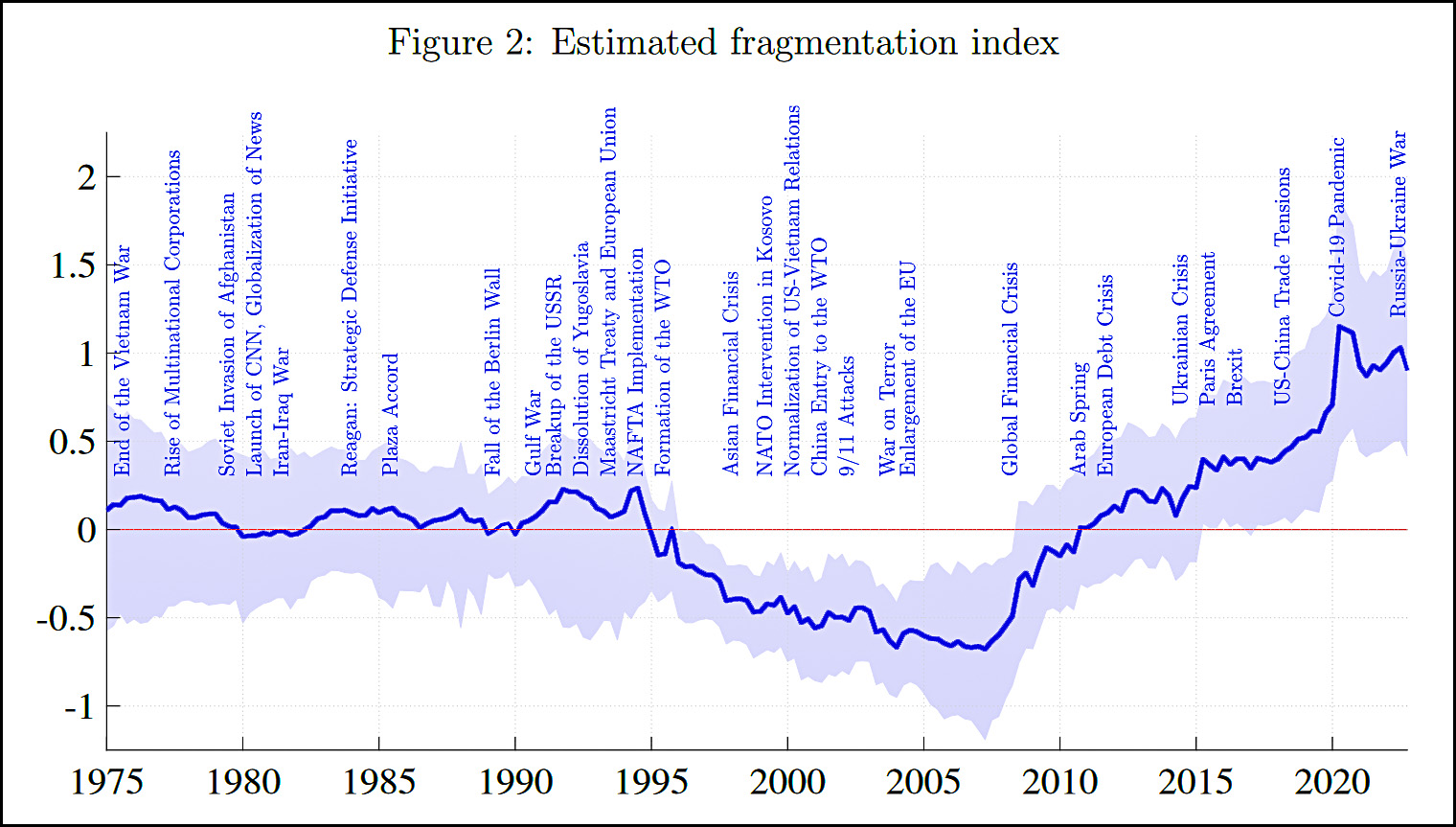A team of researchers says the global economy is becoming more fragmented:
To measure this phenomenon, we introduce an index of geopolitical fragmentation distilled from diverse empirical indicators. To do so, we rely on the use of a flexible, dynamic factor model with time-varying parameters and stochastic volatility. Then, we employ structural vector autoregressions and local projections to gauge the causal effects of changes in fragmentation.
Um, OK. It's pretty obvious there's no point in my reading the paper, since I have no hope of understanding it. So here's the bottom line:
 The impact on the US economy is, once again, too abstruse for me to understand, but the authors basically say that fragmentation has been good for the construction industry and bad for the transportation industry. It's been sort of bad for manufacturing and durable goods, and meh for everything else.
The impact on the US economy is, once again, too abstruse for me to understand, but the authors basically say that fragmentation has been good for the construction industry and bad for the transportation industry. It's been sort of bad for manufacturing and durable goods, and meh for everything else.
The moral of the story is that.......we should work to become less fragmented. More globalization, please.

It's hard to see how this measure is calculated, but for that matter, I couldn't explain how measures like the Gini coefficient, US News college rankings, or WAR in baseball are calculated either. But just about everything that can be quantified will be. At least someone will try.
For what it's worth, it looks like the end of the Cold War broke the equilibrium that existed previously. The birth of the internet happened then too. A period of increasing globalization lasted until the GFC, when the trend reversed. Now we're more and more fragmented. What comes next?
Globalization is a dirty word these days. It coincided with with a more polarized and unequal society domestically. Yet on the whole, globalization did wonders for lowering inequality around the world. The US may do better than the rest in a more fragmented world, but if the gap between nations and regions widens too much, that's just another crisis waiting to happen.
It's not exactly the "end of the cold war" that is core. It's the explosion of (F)ree (T)rade (A)greements, starting with the creation of the EU (1993) and NAFTA (1994).
Thank you for your honesty. A dozen semi-literate reporters will head-scratch their way through the executive summary of the paper, then produce some kind of clickbait story ("story" is right) about some misinterpretation of "what it all means". Well-intentioned readers will assume it's right and go off to do stupid things as a result.
But not here! Thank Kevin!
Things are more fragmented now than in 1975 when the cold war was still going on, Europe had not been unified and China was isolated? Globalization has been completely reversed? This is very hard to believe.
Fasten your seatbelt, it’s going to be a bumpy ride - to the global mean.
Then we get: https://www.cnbc.com/amp/2024/04/17/biden-wants-to-triple-china-tariffs-on-steel-aluminum-imports.html
Nope. Globalization contributed to the pandemic and inability to fight evil regimes. We need more autarky not less.
For what it's worth, I think fragmentation/the inversion of globalization is due to the United States' energy independence and pivot to manufacturing less far away (Mexico and at home), even if it doesn't show up yet in trade stats. Europe which has neither is out in the cold and China manages with Russian energy and diversified export markets.
I'm not American but if I were, I'd be happy with this.